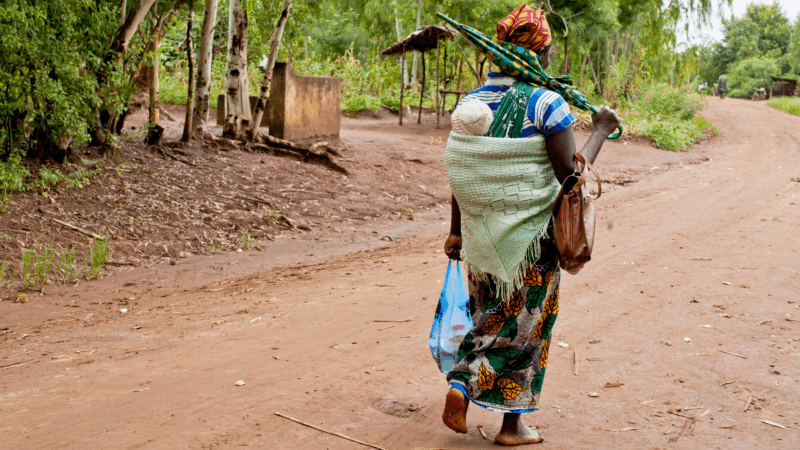Babies take a lesson from soldiers in the war against malaria
Babies may soon join soldiers in the fight to ward off malaria.
For years, the U.S. military has treated uniforms with insecticide to repel mosquitoes and the malaria they can transmit. Ross Boyce used to wear one before becoming an infectious disease physician and malaria researcher at the University of North Carolina at Chapel Hill.
He wondered if babies could get similar protection – not from a uniform but by treating the baby wraps that many moms in sub-Saharan Africa use to carry their little ones.
“It seems sort of an obvious thing to do,” he says, especially given the risk — nearly every minute, a child under 5 in sub-Saharan Africa dies from malaria. Plus, existing tools like insecticide-treated bed nets can only protect kids while they’re sleeping.
So Boyce and his colleagues tested this idea in a large randomized controlled trial. In a rural part of western Uganda, 200 mothers with kids between 6 and 18 months got a permethrin-soaked baby wrap, while 200 others got a wrap just soaked in water. All participants got a brand-new treated bed net too.
Over the course of 6 months, the young participants visited clinics every two weeks to be checked for malaria symptoms and tested. The team also looked for side effects. Every four weeks, the researchers re-soaked the wraps in case the permethrin wore off. “That was probably overkill,” says Boyce. “But we really wanted to know, if we have enough permethrin in there, does it work?”
The answer: a resounding yes. “It was a level of effect that was beyond even our wildest expectations,” says Boyce.
Over 6 months, 34 kids in the permethrin-wrap group tested positive for malaria, compared with 94 in the water-soaked wrap group, a reduction of about 65%.
“It’s a really large reduction, surprisingly so,” says Thomas Eisele, a malaria researcher at Tulane University who wasn’t involved in the study. The scale of the reduction suggests mosquitoes are biting more often than thought during the daytime, he says.
“We’ve hit a brick wall where we just weren’t making progress with our existing tools,” says Eisele. “These types of interventions are going to be critical.”
The major reductions didn’t seem to come with major side effects over the course of the experiment, which was a worry. Permethrin can cause growth and neurological problems if ingested at high levels.
“When [permethrin] is treated on fabric, there’s much less transmission through the skin,” he says. Plus, kids were generally clothed underneath the wrap, so there wasn’t much direct contact. Still, about 8.5% of babies had a mild rash in the treatment group compared with 6% in the control.
“Nothing is zero risk, and it’s a tradeoff that needs to be considered,” he says, “but we know getting malaria is not good for children either.”
In the real world, retreating the wraps as often as they did during the experiment could be impractical, says Boyce. But it also may not be necessary since manufacturers are able to create long-lasting permethrin-treated garments.
Down the line, Boyce imagines mothers could get a long-lasting wrap when they come to clinics to get vaccines, providing some extra protection before the babies start walking around on their own.
However the rollout might work, demand would be high, predicts study co-author Edgar Mulogo, a researcher at Mbara University in Uganda. “The excitement to use [the wraps] was just tremendous,” he says. He heard one participant say “when the children were under the wraps, they were not getting bitten.”
Between Megan Moroney and Ella Langley, country women rule the charts
It's a big week for women in country music — and, it turns out, for women whose songs are favored by women in figure skating.
A Jan. 6 rioter pardoned by Trump was sentenced to life in prison for child sex abuse
Since receiving presidential pardons, dozens of former Capitol rioters have gotten into more legal trouble. In Florida, Andrew Paul Johnson was sentenced to life in prison for child sex abuse.
President Trump, Pam Bondi sued over sale of TikTok assets
The case, filed in a federal court in Washington, D.C., accuses the Trump administration of ignoring legislation designed to stop the spread of Chinese propaganda — and instead helping to broker a partial sale to businessmen close to Trump.
A rift between Spain and Trump widens over Spanish opposition to the Iran war
The Spanish government reiterated it would not let U.S. forces use two joint military bases in Spain as the U.S.-Israeli war in Iran escalates, widening a rift with the Trump administration.
Blackpink, modern K-pop’s trailblazing group, tries to find its way home
A new mini-album finds the world's biggest girl group in a tight spot: competing with its own legacy.
If you loved ‘Sinners,’ here’s what to watch next
So you loved best picture nominee Sinners. What should you watch next? We asked our audience to share their recommendations. They suggested Near Dark, The Wailing and other vampire horror films.






